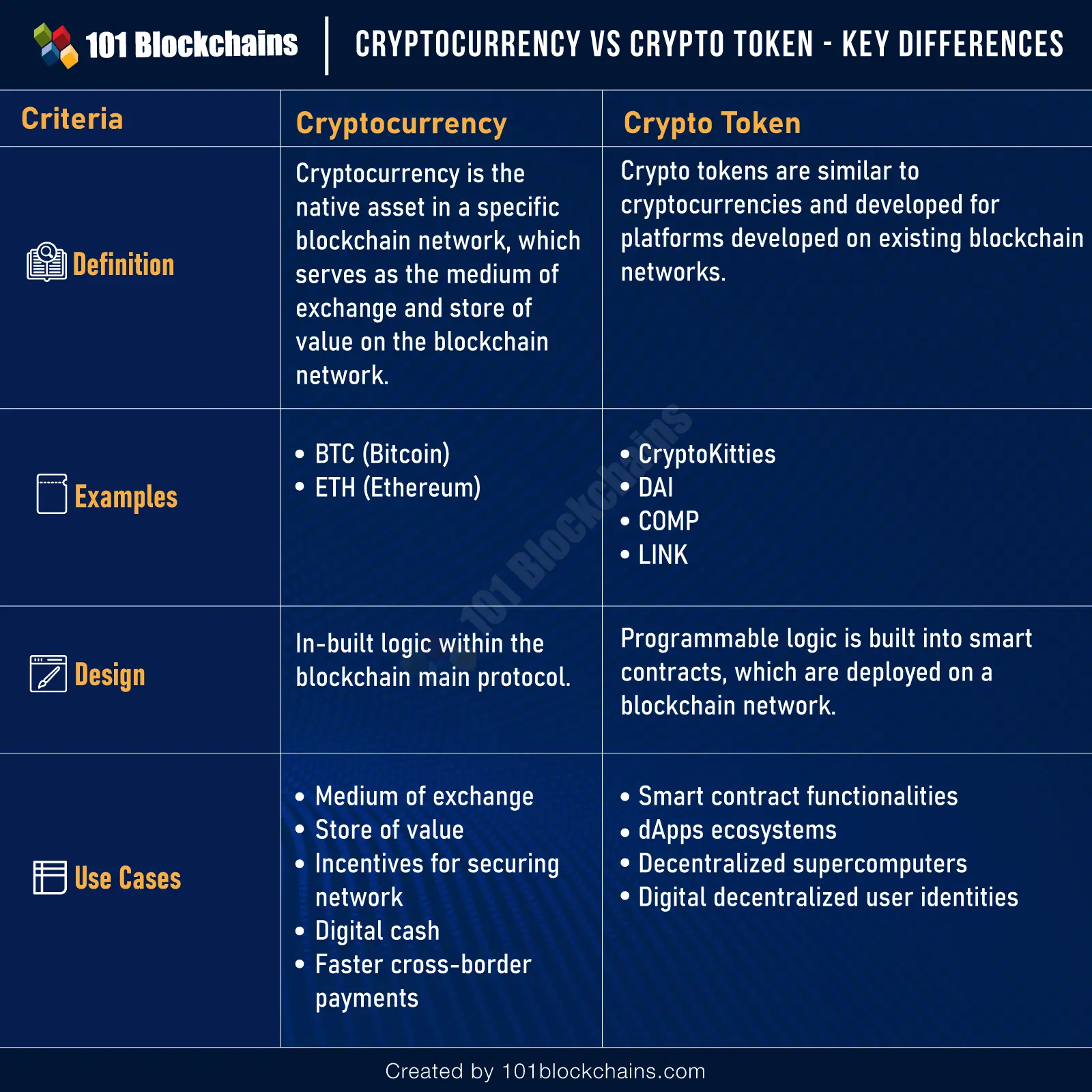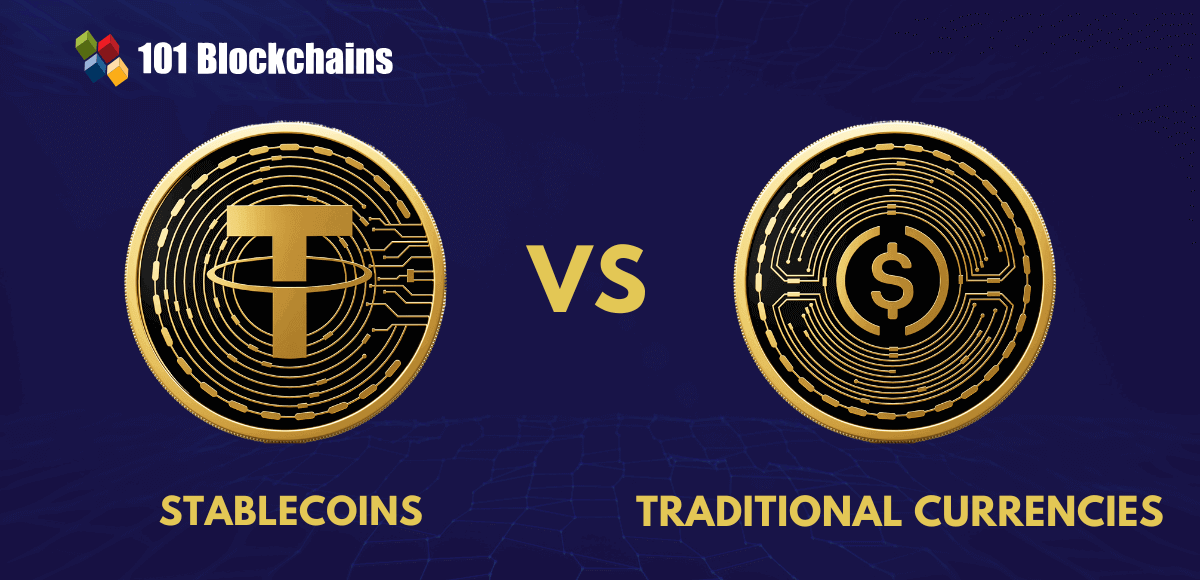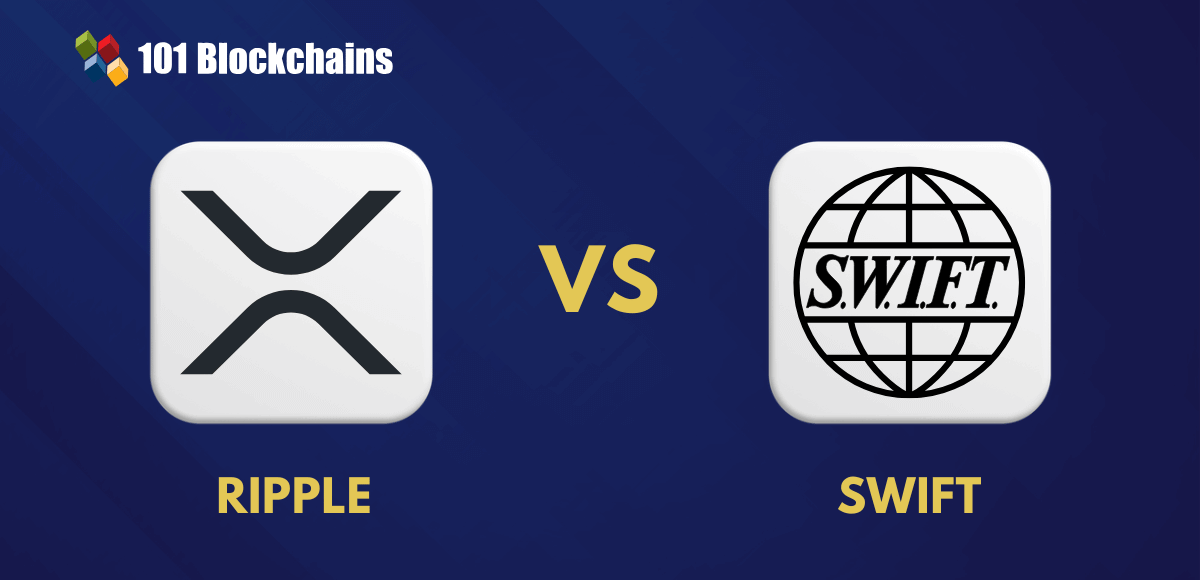Learn how blockchain truly works, master key definitions, and uncover what makes smart contracts so "smart." Dive into the fundamentals, gain valuable insights, and start your blockchain journey today!

- Comparisons
James Howell
- on February 25, 2022
Cryptocurrencies vs Tokens – What’s the Difference
Cryptocurrencies and digital assets are the biggest trends in the tech landscape right now. People all over the world use cryptocurrencies, which is evident in almost 80 million registered blockchain wallets worldwide. However, many people in the crypto space often confuse cryptocurrencies with tokens. The cryptocurrencies vs. token differences are quite subtle, and you might experience difficulties in differentiating one from the other.
On the other hand, the interchangeably used terms have some key differences between them. How can you identify the differences between these two categories of digital assets? The following discussion helps you find reliable answers to the token vs. cryptocurrencies debate. You can discover a detailed overview of the differences between cryptocurrencies and crypto tokens from different aspects.
Want to become a Cryptocurrency expert? Enroll Now in Cryptocurrency Fundamentals Course
Understanding Digital Assets
If you are trying to find answers for “Is cryptocurrency same as token?” then you must know about digital assets. In the world of blockchain, cryptocurrency and crypto tokens are digital assets. The broader definition of digital assets paints them as non-tangible assets, which you can create, trade, and store in digital formats on a blockchain.
As a matter of fact, cryptocurrencies and crypto tokens are distinct subclasses of digital assets, leveraging the capabilities of cryptography. The benefits of cryptography as an advanced encryption technique helps in verifying the authenticity of crypto assets. How? Cryptography takes away any possibilities of double-spending or counterfeiting in crypto assets.
If both cryptocurrencies and crypto tokens are digital assets, what is the point of cryptocurrencies vs. token comparison? The primary difference between the two digital assets in crypto space is that cryptocurrencies are native assets on blockchain networks. For example, BTC on the Bitcoin blockchain or ETH on the Ethereum blockchain is cryptocurrencies.
On the other hand, crypto tokens are developed for serving additional functionalities on platforms created on existing blockchain networks. For example, many ERC-20 tokens in the Ethereum ecosystem are crypto tokens. However, the difference between cryptocurrencies and tokens is not limited only to this particular highlight. You can discover many other differences between cryptocurrencies and crypto tokens by understanding each of them comprehensively.
Build your identity as a certified blockchain expert with 101 Blockchains’ Blockchain Certifications designed to provide enhanced career prospects.
Definition of Cryptocurrencies
Cryptocurrencies basically refer to the native asset of a blockchain network. You can trade cryptocurrencies or use them as a medium of exchange and even as a store of value. The basic definition of cryptocurrencies is a major highlight of crypto vs. token comparisons. You can notice how the blockchain network protocol itself issues cryptocurrencies, which serve as the native currency of the blockchain network. Cryptocurrencies also serve another crucial purpose in blockchain networks other than serving as the preferred means of payment for transaction fees on the blockchain. Blockchain networks also incentivize users with cryptocurrencies for securing the network.
You can clearly identify how cryptocurrencies work as a store of value and medium of exchange. You can use this information to draw a better token vs. cryptocurrencies comparison. Now, you must note the specific traits of cryptocurrencies which are often responsible for the parallels drawn with tokens.
- Decentralization is the key highlight of cryptocurrencies, as you don’t have a central issuing authority. On the contrary, cryptocurrencies depend on code for managing transactions and issuing cryptocurrencies.
- The Distributed Ledger Technology or DLT functionality of cryptocurrencies enables automated and trustless enforcement of system rules.
- Most important of all, cryptocurrencies bring the value of cryptography for security of the underlying network and infrastructure for a concerning cryptocurrency.
Want to get an in-depth understanding of crypto fundamentals, trading and investing strategies? Enroll Now in Crypto Fundamentals, Trading And Investing Course.
Definition of Crypto Token
The next important requirement for identifying the difference between cryptocurrencies and tokens is the definition of crypto tokens. Crypto tokens are basic units of value developed by blockchain-based organizations or projects over existing blockchain networks. They are similar to cryptocurrencies in terms of essential traits such as decentralization, transparency, and cryptographic security.
However, crypto tokens are a completely different category of digital assets. Crypto tokens can also serve as a store of value and medium of exchange like cryptocurrencies. On the other hand, crypto tokens can also represent specific physical assets and digital services or utilities. For example, you can find crypto tokens as a representation of real estate and art.
Developers can create crypto tokens for specific projects in the form of smart contracts and deploy them on existing blockchains. The use of smart contracts implies that the behavior of crypto tokens has not been developed in the blockchain main protocol. On the contrary, the behavior of crypto tokens depends considerably on their implementations in smart contracts.
The basic objective of crypto tokens also serves as a critical highlight in answering “Is cryptocurrency same as token?” with emphasis on more than just payments. Crypto tokens can work for the wide ecosystem of a blockchain platform by serving various functionalities. For example, you can find applications of cryptocurrency tokens for driving user engagement and innovation in a blockchain network community.
In addition, crypto tokens can also serve as rewards for participation in activities on a blockchain platform. Most important of all, majority of crypto tokens serve as the foundations for the thriving dApp ecosystem on Ethereum.
Curious to know the impact and in-depth understanding of crypto compliance in businesses? Join the Standard & Premium Plans and get free access to Crypto Compliance Fundamentals Course.
Differences between Cryptocurrencies and Crypto Tokens

Please include attribution to 101blockchains.com with this graphic. <a href='https://101blockchains.com/blockchain-infographics/'> <img src='https://101blockchains.com/wp-content/uploads/2022/02/Cryptocurrency-vs-Crypto-Token-Key-Differences.png' alt='Cryptocurrency vs Crypto Token' /> </a>
The basic understanding of cryptocurrencies and crypto tokens offers a basic ground to start uncovering the differences between them. You must have predicted some of the differences from a fundamental overview of cryptocurrencies and tokens. Here are some of the notable differences you can find in cryptocurrencies vs. token debate.
Definition
The first point of difference between cryptocurrencies and tokens obviously points towards their definitions. Cryptocurrencies are the native currency of a blockchain network issued by the main blockchain protocol itself. The best example of a cryptocurrency is Bitcoin.
On the other hand, crypto tokens are developed for serving unique targeted functionalities with smart contracts deployed on blockchain platforms. In the case of Ethereum blockchain, the cryptocurrency is Ether or ETH. However, you can find many other crypto tokens utilizing the power of Ethereum blockchain. Some of the examples of crypto tokens developed by using Ethereum blockchain include DAI, CryptoKitties, COMP, and LINK.
Design
The next critical factor in crypto vs. token comparison would refer to the basic design underlying cryptocurrencies and tokens. Cryptocurrencies are available as in-built logic in the blockchain protocol. Therefore, you can identify that cryptocurrency units are integrated into protocol of the blockchain software only.
Crypto tokens, on the other hand, are available as programmable logic in smart contracts which have been deployed on existing blockchain networks. Developers can tailor smart contracts underlying crypto tokens for different purposes. You can find examples of utility tokens and security tokens as promising highlights for identifying the flexibility of use cases of crypto tokens. Crypto tokens are generally designed in accordance with specific token standards such as ERC-20 and ERC-721.
Curious to know about the key differences between ERC-20 and ERC-721? Check out our guide on ERC-20 vs ERC-721
Use Cases
The most prominent factor for identifying token vs. cryptocurrencies differences is the outline of their use cases. An outline of the use cases of cryptocurrencies and crypto tokens can offer a clear impression of how they are different from each other. As a matter of fact, the use cases of crypto tokens and cryptocurrencies serve major inputs for defining the difference between cryptocurrencies and tokens with better clarity.
-
Cryptocurrency Use Cases
First of all, you need to note that cryptocurrencies can serve only as a medium of exchange and store of value. Blockchain networks can incentivize users with cryptocurrencies for securing the network. However, the use cases of cryptocurrencies primarily revolve around its identity as a store of value and medium of exchange. Cryptocurrencies can serve as a store of value, as you can notice in the example of Bitcoin. It focuses on offering an efficient alternative to conventional banking by enabling decentralized transactions.
Bitcoin has completely shunned the need for centralized ledgers and turned into reliable stores of value. The cryptocurrencies vs. tokens debate would also focus on the uses of cryptocurrencies as digital cash. For example, Dash aims at offering anonymous digital transactions with the help of its PrivateSend functionality.
Another important use case of cryptocurrencies is the facility for international payments. The example of XRP cryptocurrency of Ripple blockchain network facilitates real-time international transactions with better speed and ease. Without any complicated and centralized counterparty approval and clearance processes, XRP can serve efficient international remittances without any complexities.
Want to know about top cryptocurrencies which hold the most potential? Read: Top 10 Cryptocurrencies before doing investment plans.
-
Crypto Tokens Use Cases
The applications of crypto tokens extend beyond the usual medium of transfer and store of value functionalities. You can find a clear overview of tokens vs. cryptocurrencies by identifying the use cases of crypto tokens. One of the foremost applications of crypto tokens emerges from the smart contract functionalities available with them.
Smart contracts are basic protocols for automating transactions according to mutually agreed conditions in contracts. The use of smart contract-based crypto tokens can introduce many value advantages in different industries, such as real estate sector. For example, crypto tokens can serve a crucial role in automation and decentralization of property sales procedures.
Another significant highlight in favor of crypto tokens in the difference between cryptocurrencies and tokens is their application in dApps. Crypto tokens are an integral necessity for the constantly evolving ecosystem of decentralized applications. Most importantly, crypto tokens are a vital component in the newly emerging NFT and DeFi ecosystems across various games and lending platforms.
In addition, crypto tokens also serve as the foundations for supercomputer platforms, as evident in the example of Golem. It is the first decentralized supercomputer drawing power exclusively from data centers and individual computers worldwide. Crypto tokens play a massive role in powering the Golem supercomputer.
Another notable mention among the use cases of crypto tokens refers to digital user identities. For example, the Civic token offers a decentralized digital identity solution. The Civic token can support verification of access to different digital services.
Aspiring to Become a Certified NFT Expert? Enroll in Certified NFT Professional (CNFTP) Course Now!
Conclusion
The answer to “Is cryptocurrency same as token?” might be a little different for you now as compared to the beginning of the discussion. You can notice the numerous subtle differences between cryptocurrencies and tokens. The basic overview of cryptocurrencies and crypto tokens, as well as their design and functionalities, reflects a lot on the differences between them.
In simple terms, you can think of cryptocurrencies as limited-use entities and crypto tokens as the flag bearers of opportunities in decentralization. For example, crypto tokens can open up new roads for representing physical assets on blockchain networks. Learn more about the crypto world and how digital assets will evolve in this space in future.
*Disclaimer: The article should not be taken as, and is not intended to provide any investment advice. Claims made in this article do not constitute investment advice and should not be taken as such. 101 Blockchains shall not be responsible for any loss sustained by any person who relies on this article. Do your own research!





